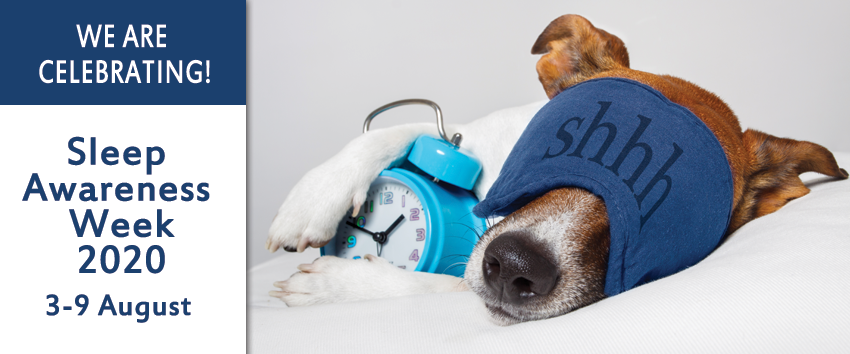Sleep Awareness Week 2020
This week is Sleep Awareness Week (3-9 August, 2020) and it is a great time to remember getting a good night’s sleep is critical to maximizing your overall health and wellbeing.
Why is Sleep Health so Important?
Having a good night’s sleep is important for brain function, muscle repair, your immune system and metabolism. It helps you fight off infection, maintain a healthy weight and avoid chronic diseases like type 2 diabetes and heart disease.
It also helps balance your mood and emotions, which reduces anxiety and depression. Lack of proper sleep effects not only your physical and mental health, it also can affect your safety as well. Risk of road and workplace injuries and accidents increase with consistent poor sleep.
Quality vs Quantity
It is important to make sure you are always getting an adequate amount of good quality sleep.
Quality – If you have great quality of sleep, but its only lasts 4hrs, its not going to be long enough in duration for your body to properly repair and restore itself.
Quantity– In-turn, even if you have 10hrs sleep, but it is very poor due to disruption, such as shift work or a sleep disorder again your body will not be able to properly repair and restore itself.
Sleep Hygiene
According to the Mayo Clinic1,the average adult requires 7-9 hours of sleep every night to function at our peak. To improve the quality of your sleep, you should practice good sleep hygiene, here are a few suggestions:
Do:
- Set a routine for going to bed and waking up. This helps to set up a natural rhythm for your body.
- Get your daily Vitamin D intake. Vitamin D promotes melatonin which will help you sleep.
- Have a comfortable sleeping environment. Is your room cool, dark and quiet?
- Your bed should be for sleep, it needs to be associated in your mind as the place you go for sleep – not to watch TV or work.
- Make sure you give your body time to relax each night before bed.
Don't:
- Drink caffeinated drinks before bed, caffeine is a stimulant and may keep you awake. Caffeine can be found in coffee, tea, chocolate and soft drinks.
- Exercise also acts as a stimulant, therefore it can prevent you from falling asleep. Exercise should take place at least 2 hours prior to bed.
- Another stimulant is nicotine, which can also make it hard for you to fall asleep.
- Drink alcohol before bed. Alcohol is a muscle relaxant may worsen snoring or a sleep disorder such as sleep apnea.
- Eat heavy, spicy or sugary meals or go to bed hungry, as this may promote a restless night.
Effects of Poor Sleep
The light from electronic devices can suppress melatonin, which is the hormone that helps you go to sleep. For example: If you read for 1 hour on an iPad it can delay the release of melatonin by 3hrs2.
Sleep deprivation makes you eat extra calories. When you are under slept you don’t just eat more, you eat more of the wrong things, like carbs and sugars2.
Every 30 seconds there is a car accident linked to lack of sleep. Drowsy driving kills more people on the road than alcohol and drugs combined. Studies show that 1 extra hour of sleep reduced road accidents by 70%. As a comparison the advent of ABS brakes only reduced accidents by about 25%2.
The cardiovascular system only takes 1 hour of sleep deprivation for it to effect people. When daylight savings time starts there is a 24% increase in heart attacks, then when it finishes there is a 21% decrease in heart attacks2.
Sleep boosts testosterone and lack of sleep makes you 10 years older from a testosterone standpoint2.
Critical for athletes, but applicable to people in all walks of life, if you have less than 6hrs sleep, your time to physical exhaustion is 30% quicker. And your injury risk is higher, For example 5hrs vs 9hrs of sleep = 60% higher probability of injury2.
There is no such thing as a ‘sleep bank’, you can’t accumulate a sleep debt and then hope to cash it in on the weekend – sleep does not work like that, your brain does not have the capacity to regain the sleep that it has lost2.
Are you getting the sleep you need?
Many signs and symptoms of poor sleep, and possibly serious sleep disorders are often brushed off or ignored. If you suspect that you or a loved one are not getting a good sleep, please contact your doctor.
1. Eric J, Olsen, M.D. How many hours of sleep are enough for goof health, Mayo Clinic, 2016.
2. Dr Matthew Walker, Professor of Neuroscience and Psychology at University of California, Berkeley and Founder and Director of the Centre for Human Sleep Science, Joe Rogan Podcast, 2018.
To celebrate Sleep Awareness Week at CPAP Club
we have a range of CPAP and sleep related products on sale.






